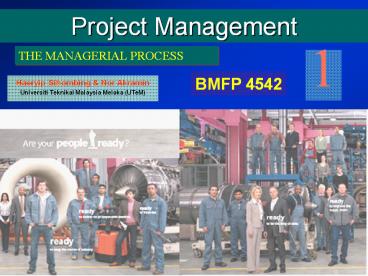Project Management 3e. - Gray and Larson - PowerPoint PPT Presentation
Title:
Project Management 3e. - Gray and Larson
Description:
Project Management THE MANAGERIAL PROCESS 1 BMFP 4542 Haeryip Sihombing & Nor Akramin Universiti Teknikal Malaysia Melaka (UTeM) An Overview of Project Management . – PowerPoint PPT presentation
Number of Views:1057
Avg rating:3.0/5.0
Title: Project Management 3e. - Gray and Larson
1
(No Transcript)
2
An Overview of Project Management .
3
What is a Project?
- A project is an interrelated set of activities
with a definite starting and ending point, which
result in a unique outcome for a specific
allocation of resources. - Project Defined
- A complex, non-routine, one-time effort limited
by time, budget, resources, and performance
specifications designed to meet customer needs.
4
What is a Project?
- Major Characteristics of a Project
- Has an established objective.
- Has a defined life span with a beginning and an
end. - Requires across-the-organizational participation.
- Involves doing something never been done before.
- Has specific time, cost, and performance
requirements.
5
What is a Project?
- Three main goals of any project
- Complete the project on time or earlier.
- Do not exceed the budget.
- Meet the specification to the satisfaction of the
customer.
- Needs the skills of multiple professions and
organizations - Requiring new combination of skills and resource
in the project process - Differences will arise with each replication,
especially due to uncertainties. So can change
the characteristic and countermeasures.
6
Programs versus Projects
- Program Defined
- A series of coordinated, related, multiple
projects that continue over an extended time and
are intended to achieve a goal. - A higher level group of projects targeted at a
common goal. - Example
- Project completion of a required course in
project management. - Program completion of all courses required for a
business major.
7
Comparison of Routine Work with Projects
Routine, Repetitive Work Taking class notes
Daily entering sales receipts into the
accounting ledger Responding to a supply-chain
request Practicing scales on the piano
Routine manufacture of an Apple iPod Attaching
tags on a manufactured product
Projects Writing a term paper Setting up a
sales kiosk for a professional accounting
meeting Developing a supply-chain information
system Writing a new piano piece Designing an
iPod that is approximately 2 X 4 inches,
interfaces with PC, and stores 10,000 songs
Wire-tag projects for GE and Wal-Mart
8
Project Management
- Project management is a systemized, phased
approach to defining, organizing, planning,
monitoring, and controlling projects. - A collection of projects is called a program,
which is an interdependent set of projects with a
common strategic purpose. - A cross-functional effort Even though a project
may be under the overall purview of a single
department, other departments likely should be
involved.
9
Project Management Questions
- What activities are required to complete a
project and in what sequence? - When should each activity be scheduled to begin
and end? - Which activities are critical to completing the
project on time? - What is the probability of meeting the project
completion due date? - How should resources be allocated to activities?
10
The Nature of Project Management
- Characteristics of Projects purpose, life cycle,
interdependencies, uniqueness, and conflict. - Project Management Process planning (work
breakdown structure), scheduling, and
controlling. - Selecting the Project Manager credibility,
sensitivity, ability to handle stress, and
leadership. - Building the Project Team Forming, Storming,
Norming, and Performing. - Principles of Effective Project Management
direct people individually and as a team,
reinforce excitement, keep everyone informed,
manage healthy conflict, empower team, encourage
risk taking and creativity. - Project Metrics Cost, Time, Performance
11
Project Life Cycle
12
The Challenge of Project Management
- The Project Manager
- Manages temporary, non-repetitive activities and
frequently acts independently of the formal
organization. - Marshals resources for the project.
- Is linked directly to the customer interface.
- Provides direction, coordination, and integration
to the project team. - Is responsible for performance and success of the
project. - Must induce the right people at the right time to
address the right issues and make the right
decisions.
13
Project Team
- Selecting the right project manager is critical
and specific skills are needed. - Facilitator Able to resolve conflicts, have
leadership skills and a systems view. - Communicator Ability to keep senior management
informed, communicate progress, and work with
team members. - Decision Maker Able to organize members and make
difficult decisions. - Team members need to be technically competent,
dedicated, and able to work well with other team
members.
14
The Importance of Project Management
- Factors leading to the increased use of project
management
- Compression of the product life cycle
- Global competition
- Knowledge explosion
- Corporate downsizing
- Increased customer focus
- Rapid development of Third World and closed
economies - Small projects that represent big problems
15
Integrated Project Management Systems
- Problems resulting from the use of piecemeal
project management systems - Do not tie together the overall strategies of the
firm. - Fail to prioritize selection of projects by their
importance of their contribution to the firm. - Are not integrated throughout the project life
cycle. - Do not match project planning and controls with
organizational culture to make appropriate
adjustments in support of project endeavors.
16
Integrated Management of Projects
17
The Technical and Sociocultural Dimensionsof the
Project Management Process
18
Organization Strategy and Project Selection
Having a Nice Break
Next to































